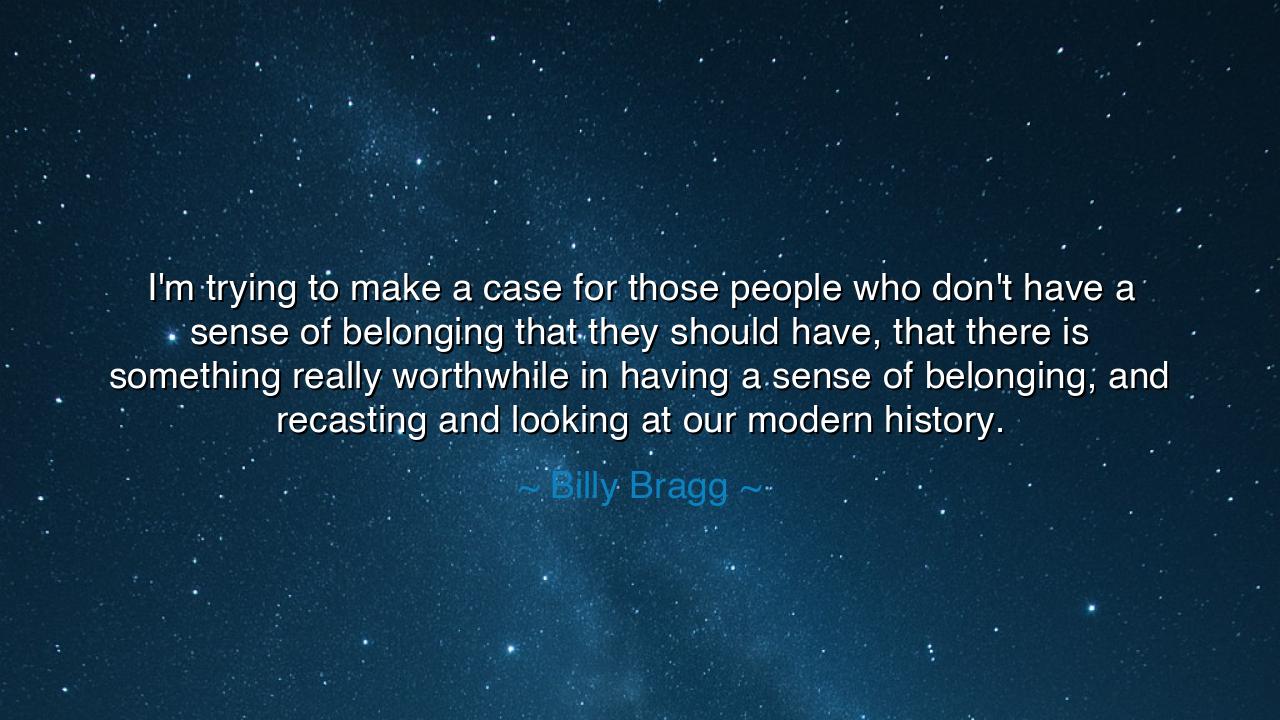
I'm trying to make a case for those people who don't have a sense
I'm trying to make a case for those people who don't have a sense of belonging that they should have, that there is something really worthwhile in having a sense of belonging, and recasting and looking at our modern history.






“I'm trying to make a case for those people who don't have a sense of belonging that they should have, that there is something really worthwhile in having a sense of belonging, and recasting and looking at our modern history.” Thus spoke Billy Bragg, the troubadour of conscience, whose songs and words have long sought to mend the torn fabric of modern society. In this statement, he calls out to the dispossessed of spirit, to those who wander through the noise and loneliness of our age, untethered from community, from meaning, from shared identity. His message is not one of mere nostalgia, but of restoration — a call to reclaim belonging as the root of both self and society. For without belonging, no civilization can endure; without connection, no heart can truly thrive.
Bragg’s words emerge from the soil of modern Britain, yet their truth reaches far beyond place and time. In an era of individualism and alienation, he sees a world where many no longer feel part of a common story. The “sense of belonging” — once the quiet pulse of villages, neighborhoods, and nations — has been replaced by fragmentation, by walls both physical and invisible. The artist, therefore, seeks to “recast our modern history,” not to erase it, but to reimagine it through unity, reminding us that history itself is a shared home. His call is ancient: that the strength of any people lies not in their divisions, but in their capacity to remember that they belong to one another.
The ancients understood this truth well. The Greeks spoke of “polis”, the city not merely as a place of commerce, but as a living body of citizens bound by shared purpose. To belong to the polis was to be human; to be cast out from it was a kind of death. So too did the tribes of old sit in circle around their fires, telling stories that reminded each heart of its place in the whole. The Roman poet Virgil wrote, “No day shall erase you from the memory of time” — a promise that belonging endures through remembrance. Bragg’s words echo this timeless longing: to restore memory as a bridge between solitude and solidarity, between the self and the greater story.
Consider the story of Nelson Mandela, who emerged from the dark cell of Robben Island not filled with vengeance, but with a profound sense of belonging — not just to his people, but to all humanity. Though he was imprisoned and exiled, his spirit was never outside the circle of belonging, for he carried his people within him. When he spoke of reconciliation, he did not speak as one forgiving strangers, but as one welcoming home estranged brothers. His vision rebuilt a nation fractured by hatred, proving that belonging is not inherited but created, one act of compassion, one recognition of shared humanity at a time.
Yet Bragg’s words also speak to a more personal truth — that belonging gives meaning to identity. In a world obsessed with individual achievement, many have forgotten the quiet power of being part of something greater than oneself. The modern heart often drifts — connected to thousands online, yet rooted nowhere. Bragg challenges this emptiness, urging us to look again at our modern history, to find in it not shame or division, but the threads that still bind us: common struggle, shared hope, the human desire for dignity. It is not enough to inherit a past; we must recast it — to see ourselves not as spectators, but as stewards of the story we share.
For when people lose their sense of belonging, the world grows brittle. The lonely heart becomes fearful, the fearful heart becomes angry, and the angry heart forgets how to listen. Nations crumble not from invasion but from the erosion of common purpose. The poet’s task, and indeed the citizen’s duty, is to rebuild those invisible bridges — through story, through empathy, through remembering. The history of belonging is not written in textbooks but in gestures of kindness, in voices that remind one another, “You are not alone.”
So, my children, take this wisdom to heart: seek belonging, and offer it. Do not wait for a community to claim you — build one. Do not despair that the world is divided — become the bridge. Learn your history, but do not be trapped by it; instead, recast it with hope, seeing in the story of your people not what separates you from others, but what joins you to them. For belonging is not a gift given by the powerful — it is a covenant renewed by every heart that dares to say, “We.”
And thus the lesson endures: to belong is to live fully, to connect one’s small flame to the greater fire of humanity. In every age, the world grows cold when men forget one another. But the warmth returns when even one voice — like that of Billy Bragg — sings again of community, compassion, and connection, reminding us that to stand together is to stand strong, and to belong is to be truly alive.






AAdministratorAdministrator
Welcome, honored guests. Please leave a comment, we will respond soon